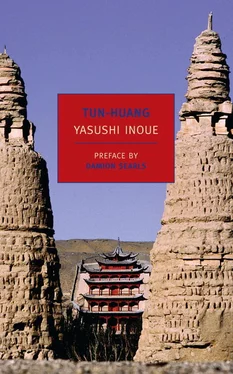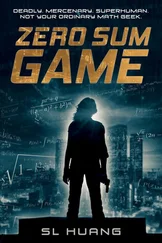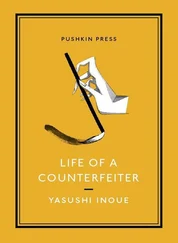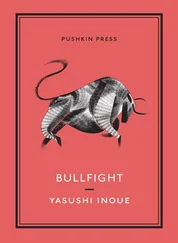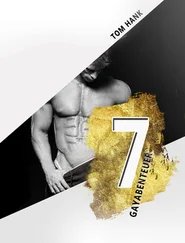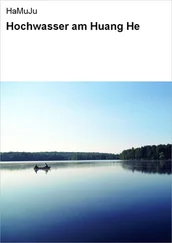One of the major characters is the Chinese commander Chu Wang-li, an indomitable warrior, who for years has fought for the Hsi-hsia army. His destiny, too, is determined by an encounter with the beautiful Uighur princess loved by Hsing-te. Although the princess appears but briefly and dies halfway through the story, her lingering influence on the two soldiers forms a central focus of the novel. The circumstances of her suicide arouse such rage and desire for revenge in Chu Wang-li that he casts all discretion aside and revolts against the Hsi-hsia emperor. This revolt brings about Wang-li’s destruction and moves Hsing-te finally to conceal the valuable scrolls in one of the Thousand Buddha Caves.
Two interesting secondary characters are Wei-ch’ih Kuang and Ts’ao Yen-hui. Kuang is a young man of royal birth reduced to the roles of traveling merchant and highwayman; Yen-hui is a devout Buddhist. Kuang is totally absorbed in making a profit and is oblivious to the rise and fall of tribes around him. His belief in his own invincibility never falters. Even as the death struggle between Wang-li and the Hsi-hsia army rages in the east and the Muslims invade from the west, he attempts to turn the situation to his advantage. Hsing-te plays upon this avarice to persuade Kuang to transport the sutras to the Tun-huang cave. To the dauntless spirit and single-mindedness of the renegade Kuang, Yen-hui’s nihilism and religious fervor afford at once a dramatic contrast and a complement.
Tun-huang is not a historical novel in the conventional sense. The true hero of the story is Tun-huang itself, which kept its secret for nine centuries. Despite many battles and other lively scenes of human activity, a deep sense of loneliness and sadness permeates the book. Its theme is essentially the passage of time and the sweep of history. Published in 1959, Tun-huang was awarded the Mainichi Prize the following year.
JEAN ODA MOY



In the spring of 1026 Chao Hsing-te arrived in the Sung capital of K’ai-feng from his provincial home in Hunan, to sit for the Palace Examination.
At this time government bureaucracy was all-powerful. To control the military, official policy had for some time been to place civil servants in key positions. Civil servants were also dispatched to sensitive posts in the army. Those who wished to succeed sought their goal by study, and success lay in passing the civil service examination held every three years.
Emperor Chen Tsung had personally written a poem to impress upon his subjects the importance of education:
No need to acquire rich lands to increase the family’s wealth,
For in books are a thousand measures of millet.
No need to build mansions in which to dwell in peace,
For in books are abodes of gold.
Complain not that you have no attendants when you leave your home,
For in books are horses in numbers beyond reckoning.
No need to lament the dearth of fair maidens when you marry,
For in books are maidens with countenances of jade.
You who would realize your aspirations,
Use the light from your window and recite the Six Classics .
If one did well in the Palace Examination, it was possible eventually to become a minister or some other high-ranking official, and provincial prefects were often selected from among those who had passed. As implied in Chen Tsung’s poem, wealth, beautiful women, and nearly everything else of value could be gained through study.
Thirty-three thousand eight hundred candidates from the provinces had gathered in the capital to take the examination that year. From this group, five hundred were to be chosen. Hsing-te had been living in the capital from spring until early summer with a friend whose home was near the Gate of Western Splendor. The city was overflowing with candidates both young and old. During this period Hsing-te had taken examinations at the Board of Procedures in the inter-pretation of the prose classics and other literature, in current affairs and in poetry. He did brilliantly in all of them.
One fine day, when the early summer sun was filtering through the elm trees onto the city’s great highway, he received a notice from the Personnel Board to sit for his final examinations: in physical abilities, rhetoric, calligraphy, and literary style. These tests demanded physical strength and beauty, fluency and precision in speech, boldness and style in writing, and elegance and logic in composition. If he passed these he faced only an oral examination with the emperor regarding political affairs. The top three candidates were ranked First, Second, and Third, and all the candidates who passed were assured brilliant futures.
Hsing-te was certain that no one surpassed him in knowledge, and he had ability enough to support this confidence. He came from a family of scholars and had been studious from early childhood. Up to this year, his thirty-second, he had constantly surrounded himself with books. The examinations that he had taken so far had been easy for him. At each test, thousands of competitors had been screened and eliminated, but not for one moment had Hsing-te doubted his own success.
That day, when Hsing-te went to the examination hall, the candidates were already gathered in an inner courtyard enclosed by corridors on four sides. One after another they were called by an official and then led through a long corridor toward the examination room. While awaiting their turn, the men lounged in chairs placed around the courtyard or walked about. A gentle breeze stirred the hot, dry air. At first Hsing-te waited impatiently for his name to be called, but after a while he resigned himself to the wait and sat down at the foot of a large huai tree. Crossing his arms, he leaned back against the tree and then settled into a more comfortable position. In time he became drowsy and slowly his eyes closed. From time to time new names were called out; then the voice grew fainter and fainter.
Before he was aware of it, Hsing-te had fallen asleep and was dreaming. In his dream, he had been led into the emperor’s chamber. The room was lined on both sides with rows of high-ranking dignitaries in their official robes. In the center of the room was a chair. Hsing-te strode fearlessly to it and seated himself. About six feet in front of him was a raised dais veiled by a thin curtain.
“What do you think of Ho Liang’s Frontier Security Proposal?” The question had come from behind the veil of the dais in an unexpectedly booming voice. This Security Proposal had been submitted thirty years previously to the former emperor, Chen Tsung, by Ho Liang, Commander of the Yunghsing army. At that time the government had been seriously harassed by the raids of the tribes of the western border, the Hsi-hsia, who had long before threatened the newly-founded Sung dynasty. By the time Ho Liang had inspected the border colony of Ling-chou and made his recommendation, the frontier situation had become critical. No solution had been found since that time and the problem of the Hsi-hsia tribes still remained.
Hsi-hsia was a small country in the eastern part of the Wuliang territory. It had been settled long before by the Tangut people of Tibetan origin. Besides the Tanguts, numerous other barbarian tribes, such as the Turfans and Uighurs, also lived in the area. Several of them had formed small kingdoms, but only Hsi-hsia had become powerful. Not only did it oppress the other tribes but it also repeatedly invaded the western frontiers of China. Officially, Hsi-hsia declared its vassalage to Sung China, yet at the same time conferred in secret with Khitan, which had long been China’s enemy. This flagrant insubordination had been a thorn in China’s side for years. The Ling-wu area, which bordered on Wuliang, was devastated almost annually by the Hsi-hsia cavalry, and the situation was so serious that a year before Ho Liang had presented his proposal to the court, voices were raised to abandon Ling-wu.
Читать дальше
